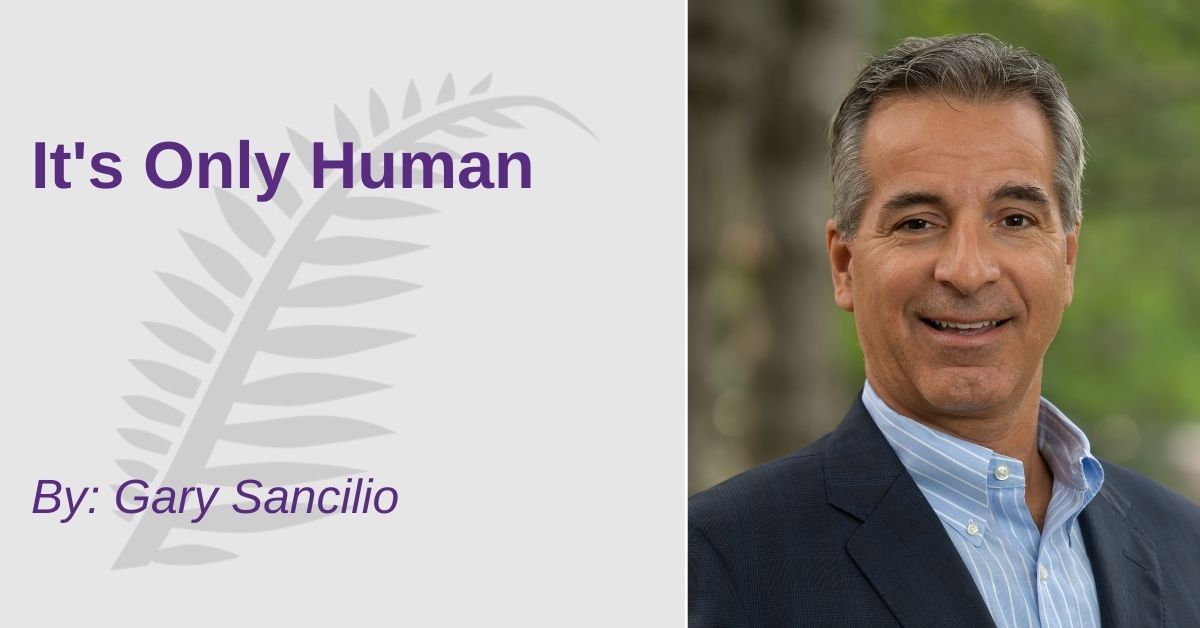It’s Only Human: How Behavioral Patterns Impact Financial Plans

I’m always interested to see how clients respond to the couch in my office.
“Oh, I thought we were going to talk about estate planning, not about me. Should I lie down?
After 30 years as both a financial coach and a lawyer, I’ve learned a lot about human nature. People often don’t get real until we set the spreadsheets aside. Money talks, but it also triggers deeply ingrained behaviors and assumptions. Becoming aware of those behaviors (so that they work for and not drive us) is the foundation of sound decision-making, financial or otherwise.
The Heart of the Matter
My clients are wealthy people: they don’t need me to tell them how successful they are. To understand how I can best help them, I first need to get “in the front door of their house,” past the public persona to their unique story and values – to what is meaningful to them. The discovery process is more Socratic than anything:
-
Why are you here?
-
What keeps you up at night?
-
Where do you see yourself in 10 (20) years?
-
How do you feel about stepping back from your business?
People like to talk about themselves: they open up; I observe and listen carefully. Behavioral patterns emerge – patterns that, for better or worse, influence decision-making. Whether we’re conscious of them or not, we all share these basic behaviors. My job isn’t to make people change; it’s to help them recognize their tendencies so they understand the consequences of their decisions.
Clients often tell me, “No one’s ever drilled down into this stuff before.” In the end, a surprising number actually do stretch out on that couch to share their hopes and concerns for themselves, their spouses, children, and businesses.
Drilling Down into Values
Charles is too busy running the $25M business he started to update his 15-year-old estate plan. He completes our questionnaire but keeps asking what’s the “quantitative and qualitative value” of paying for my advice. That’s okay: I’m here to help him discover for himself that all of his decisions have costs, not just the ones he calls “expenses” or the kind you can itemize.
Guys like Charles usually don’t sweat the small annual losses until they’re facing retirement. Why should they, when they are making money? Then, suddenly they’re shocked by the idea of their income stopping and of turning over the reins of the business, not to mention that they know their kids don’t have the chops to handle their own money, let alone a $25M business. And those “little annual costs” folks gloss over really add up over decades. E.g., Charles’s money is managed by his bank, whose mutual fund manager made a tax decision that cost him last year. He’s pretty ticked off. But the elephant in the room is, why is someone of his wealth invested in mutual funds to begin with, when he could own the individual assets and control his own tax situation?
To be fair, that’s just one detail, but it highlights a universal truth: Time Changes Everything. Over the past 15 years, Charles has gotten older; his children are grown up; his business has grown X%. His net worth is Y% greater and is an aggregate of many diverse assets. The situation is complicated. His assets – investments, insurance, real estate – are siloed into multiple, independently developed documents. The big picture – how his estate plan will impact his family – is obscured. But it doesn’t have to be. That’s where I can help.
My partner and I founded ABA to offer clients a new financial planning model. Our comprehensive process integrates legal, financial, and accounting expertise to help clients reach their goals. We organize everything into a global schematic, so that it’s easier to see what’s there… and what’s not. Our process is efficient and effective. Turns out, all those documents Charles brought in did little to ensure that his family – individuals with their own passions, strengths, and weaknesses – will be able to steward their wealth wisely, rather than be stressed by it.
In fact, Charles’ existing estate plan will cost his heirs $6M in estate taxes. He now gets that he needs to update his estate plan – and that the initial fee he was wary of incurring is actually a very good investment. It’s tough to imagine a future where you’re not running the show, let alone not around to watch it. We’re too close to have the clearest perspective. Most of us postpone the nitty gritty of planning the way we put off going to the dentist. We know we should do it, but we don’t like pain. We procrastinate to avoid discomfort, and the procrastination makes us feel worse. Reluctantly we realize that to feel better in the long run, we need to face the dentist and risk the drill.
Spending Time
Procrastination is a universal human behavior – one of the biggest I help people work through. Everybody’s busy, busy, busy: too little time; too much to do. We spend time working – planning, executing, seizing opportunities, negotiating deals – so we can earn a good living. We want more and better prospects for our children than what we grew up with: nicer neighborhoods, better schools, bigger homes, nicer clothes, cars, trips… What inspires us ends up requiring our nearly perpetual motion. We build that business up: we become experts in one, big thing. But we can’t know everything.
When high-powered, take-charge owners and entrepreneurs feel they’ve earned some down time, they want to kick back and relax, enjoy their families, have fun. Just like everybody else. Who wants to spend their weekend or their vacation reviewing their portfolios and estate plans, or prepping for next year’s taxes? Not you. Not me.
I tell my clients they’re wealthy because they know how to make money, not because they know how to manage it. Different skill sets.
Guess what? You don’t have to go it alone. Think about it: you set the direction for your business, leaving day-to-day operations to your management team. You chose them well: they’re experienced; each brings specific skills; they share your values and understand your goals; you can trust them to execute on the details. Why not take the same approach to your financial life? You’re the boss: seek out experts who share your values, have the skill sets you need, and know how to work as a team. Drill down into your ambitions and the outcome(s) you want. It may feel challenging to start the conversation, but the journey is well worth it. If you’d like to talk, I’m all ears, and have a seat on the couch.
About the author:
Gary Sancilio, Founding Partner at The Affinity Group, helps clients overcome procrastination and rationalization to make financial decisions that advance their personal values.

